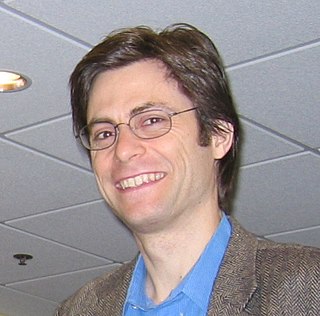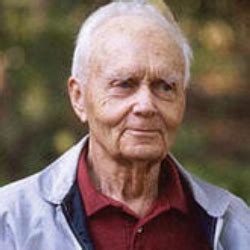A Quote by Albert Einstein
The belief in an external world independent of the perceiving subject is the basis of all natural science. Since, however, sense perception only gives information of this external world or of "physical reality" indirectly, we can only grasp the latter by speculative means. It follows from this that our notions of physical reality can never be final. We must always be ready to change these notions - that is to say, the axiomatic basis of physics - in order to do justice to perceived facts in the most perfect way.
Quote Topics
Always
Basis
Belief
Change
External
Facts
Final
Follows
Gives
Grasp
However
Independent
Indirectly
Information
Justice
Latter
Means
Most
Must
Natural
Natural Science
Never
Notions
Only
Order
Our
Perceived
Perception
Perfect
Physical
Physics
Ready
Reality
Say
Science
Sense
Sense Perception
Since
Speculative
Subject
Way
World
Related Quotes
People take it for granted that the physical world is both ordered and intelligible. The underlying order in nature - the laws of physics - are simply accepted as given, as brute facts. Nobody asks where they came from; at least not in polite company. However, even the most atheistic scientist accepts as an act of faith that the universe is not absurd, that there is a rational basis to physical existence manifested as law-like order in nature that is at least partly comprehensible to us. So science can proceed only if the scientist adopts an essentially theological worldview.
The soul of wit may become the very body of untruth. However elegant and memorable, brevity can never, in the nature of things, do justice to all the facts of a complex situations. On such a theme one can be brief only by omission and simplification. Omission and simplification help us to understand - but help is, in many cases, to understand the wrong thing; for our comprehension may be only of the abbreviator's neatly formulated notions, not of the vast, ramifying reality from which these notions have been so arbitrarily abstracted.
We call our intuition our sixth sense, but in reality it would be called our first sense, because it's rooted in quantum nature of reality. It was around long before our solar system and our planetary system were even formulated or even organized. It is at the basis of how our normal sensing works. So instead of being our sixth sense or even â€" using the parapsychological term â€" "extrasensory perception," it's not. It's at the basis of our perception, and that's the quantum world.
It is immediately apparent, however, that this sense-world, this seemingly real external universe - though it may be useful and valid in other respects - cannot be the external world, but only the Self's projected picture of it ... The evidence of the senses, then, cannot be accepted as evidence of the nature of ultimate reality; useful servants, they are dangerous guides.
Objects and their functions no longer had any significance. All I perceived was perception itself, the hell of forms and figures devoid of human emotion and detached from the reality of my unreal environment. I was an instrument in a virtual world that constantly renewed its own meaningless image in a living world that was itself perceived outside of nature. And since the appearance of things was no longer definitive but limitless, this paradisiacal awareness freed me from the reality external to myself. The fire and the rose, as it were, became one.
When you drill down, blockchains are really a shared version of reality everyone agrees on. So whether it's a fully immersive VR experience, augmented reality, or even Bitcoin or Ethereum in the physical world as a shared ledger for our 'real world,' we'll increasingly trust blockchains as our basis for reality.
We're not in the physical world. The physical world is in us. We create the physical world when we perceive it, when we observe it. And also we create this experience in our imagination. And when I say "we," I don't mean the physical body or the brain, but a deeper domain of consciousness which conceives, governs, constructs and actually becomes everything that we call physical reality.
I'm absolutely convinced that this is a world of appearances, not reality. There's one reality and that's Light and Love. When some say, we create our own reality, I always demur and say, "Please, would you mind adjusting that a little bit? We create our own appearances." We become master of appearances and as we change our thought, we will see the appearances around us change. That gives us this huge sense of dominion and power and control over our world.
In the past we have always assumed that the external world around us has represented reality, however confusing or uncertain, and that the inner world of our minds, its dreams, hopes, ambitions, represented the realm of fantasy, and the imagination. These roles, it seems to me, have been reversed. The most prudent and effective method of dealing with the world around us is to assume that it is a complete fiction - conversely, the one small node of reality left to us is inside of our own heads.
There's one uneasy borderline between what is external and what is internal, and this borderline is defined exactly by the sense organs and the skin and the introduction of external things within my own body. Consciousness is altered by physical events and physical objects, which impinge upon my sense organs, or which I introduce into my body. Now the name traditionally given to external objects or processes which change you internally is sacrament. Sacraments are the visible and tangible techniques for bringing you close to your own divinity.
It is clear that everybody interested in science must be interested in world 3 objects. A physical scientist, to start with, may be interested mainly in world 1 objects--say crystals and X-rays. But very soon he must realize how much depends on our interpretation of the facts, that is, on our theories, and so on world 3 objects. Similarly, a historian of science, or a philosopher interested in science must be largely a student of world 3 objects.



































